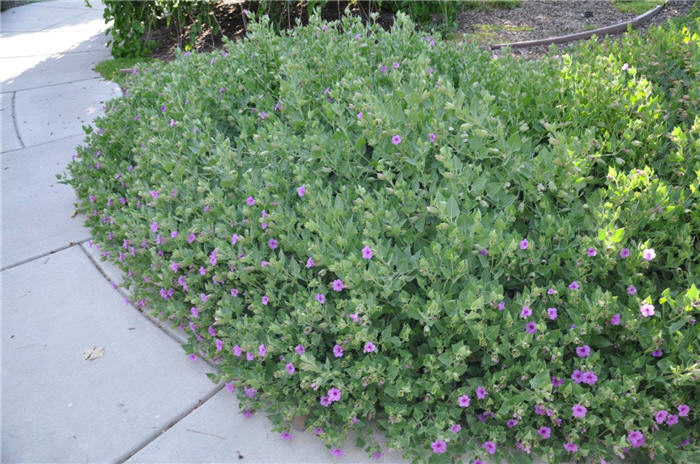| Botanical Name: Mirabilis multiflora | |
| Common Name: Desert or Colorado Four O' Clock |

-
Anatomy
-
Culture
-
Design
Plant Type
Ground cover, Perennial
Height Range
1-3'
Flower Color
Pink
Flower Season
Summer
Leaf Color
Green, Blue Green
Bark Color
n/a
Fruit Color
n/a
Fruit Season
n/a
Sun
Full, Half
Water
Very Low
Growth Rate
Moderate
Soil Type
Sandy, Clay, Loam, Rocky, Unparticular
Soil Condition
Average, Poor, Well-drained, Dry
Soil pH
Neutral, Basic
Adverse Factors
Attracts Bees
Design Styles
English Cottage, Mediterranean, Ranch, Spanish, Native Garden
Accenting Features
Showy Flowers
Seasonal Interest
Summer
Location Uses
Perennial Border, Patio, Raised Planter, With Rocks
Special Uses
Cascade, Filler, Mass Planting, Small Spaces
Attracts Wildlife
Hummingbirds, Butterflies
Information by: Stephanie Duer
Photographer: Mountain States Nursery
Photographer: Mountain States Nursery
-
Description
-
Notes
Desert Four O'Clock has a clumping to spreading habit. Leaves are fleshy and soft green. Flowers are funnel-shaped, hot pink to magenta, and appear in abundance June through October. Will burn to ground with frost but recovers quickly if the weather warms. Looks stunning cascading over low walls or tucked between boulders. Attracts humming birds, native birds, and hawk moths. Accepts full sun or partial shade. Needs a well drained soil. Native to Utah, there is one planted at the Greater Avenues Demonstration Garden.
Wide spreading perennial growing under 24 inches but spreading 4 to 5 feet. Blooms are only open when skies are sunny. Slow to grow in spring, it needs warm days to get started so don't be impatient and toss it out by mistake. Attractive to bees, bumblebees, moths, and hummingbirds.